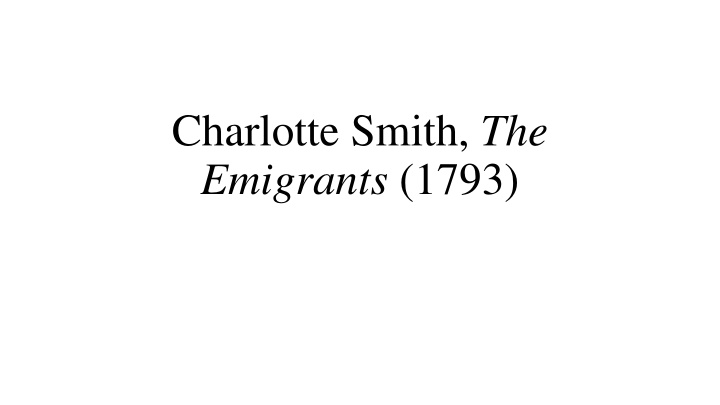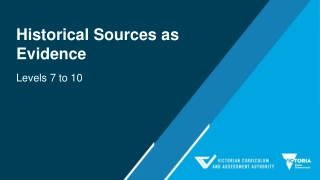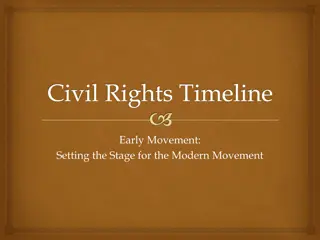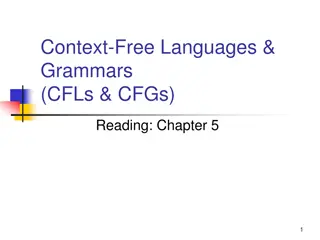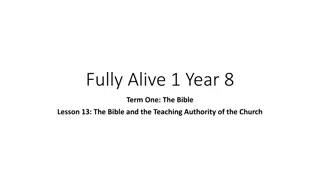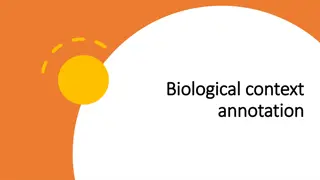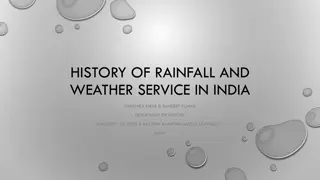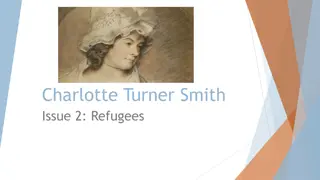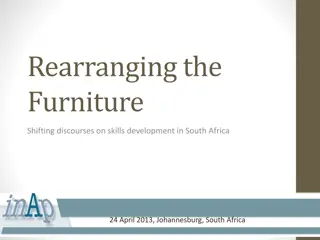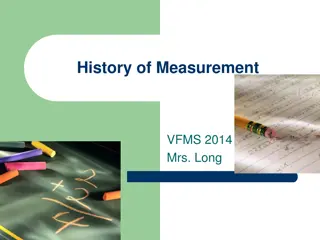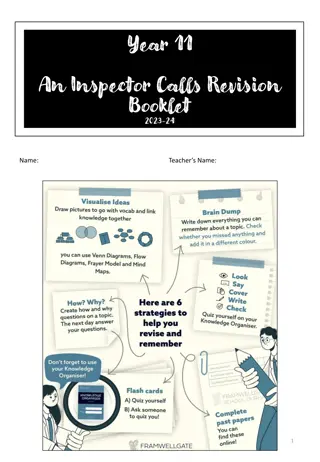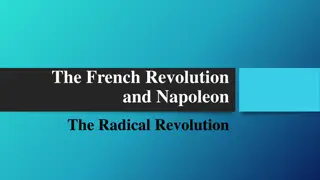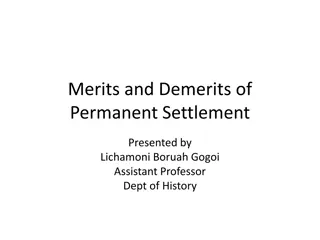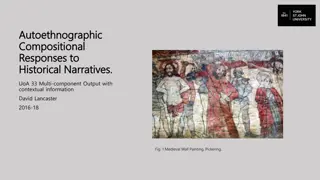The Emigrants (1793) - Historical Context and Events
Set during the turbulent times of the French Revolution, "The Emigrants" by Charlotte Smith captures the political upheaval and societal changes in France during 1792 and 1793. The story unfolds against a backdrop of revolutionary events such as the execution of Louis XVI, France's declaration of war on Britain and Holland, the Reign of Terror, and the fall of the monarchy. Through the narrative, Smith intertwines the personal struggles of emigrants with the larger historical events, providing a compelling insight into the era's complexities.
Download Presentation

Please find below an Image/Link to download the presentation.
The content on the website is provided AS IS for your information and personal use only. It may not be sold, licensed, or shared on other websites without obtaining consent from the author.If you encounter any issues during the download, it is possible that the publisher has removed the file from their server.
You are allowed to download the files provided on this website for personal or commercial use, subject to the condition that they are used lawfully. All files are the property of their respective owners.
The content on the website is provided AS IS for your information and personal use only. It may not be sold, licensed, or shared on other websites without obtaining consent from the author.
E N D
Presentation Transcript
Charlotte Smith, The Emigrants (1793)
1791 September 13-14. Louis XVI formally accepts constitution. October 1. First meeting of Legislative Assembly. November 9. Assembly orders all migr s to return under pain of death. Civil marriage and divorce instituted. November 11. King vetoes Assembly's ruling on migr s. November 29. Decree of Assembly against non-juring priests (i.e. those refusing to swear oath of allegiance to the State). December 19. King vetoes Assembly's decrees against non-juring priests.
1792 February 9. Property of migr s declared forfeit to the nation. April 20. France declares war on Austria. August 10-13. Storming of Tuileries. King imprisoned with his family. September 2 Prussian army captures Verdun. September 2-6 'September Massacres' - Paris crowd murder 1200. September 20 French defeat Prussians at Valmy. September 20-21 Final sessions of Legislative Assembly. First session of the Convention. Unanimous vote to abolish monarchy. Revolutionary calendar introduced. September 21-22. Year I of the First Republic proclaimed. October 10. Convention decree forbids use of madame and monsieur, and replaces them with citoyen and citoyenne. December 11. Trial of the king begins.
1793 January 21. Louis XVI executed. February 1. France declares war on Britain and Holland. February 13. First Coalition against France formed by Britain, Austria, Prussia, Holland, Spain and Sardinia. May June. Insurrection leads to fall of Gironde and purge of all government committees except the Committee of Public Safety. July 17. Abolition of all feudal rights without compensation. July 27. Robespierre and St Just appointed to Committee of Public Safety. August 1. Metric system adopted in France. September 17. Law of Suspects and beginning of the Terror. October 10. Decree suspending constitution and sanctioning Revolutionary government for the 'duration of the war'. October 16. Execution of Marie Antoinette.
Historical Context The "scene" of Book I is set in "November, 1792," six months after priests who refused to support the Constitutional Church were declared traitors, three months after the decree for their expulsion and the arrest of the royal family at the Tuileries, two months after the September massacres (3 bishops and 220 priests among the slaughtered) and the confiscation of emigrants' property, and one month after the death penalty was established for any returnees. By November, Robespierre, the Terror's architect, had risen to power and Saint-Just was demanding judgment of Louis XVI as "a foreign enemy" of the Republic's "independence and unity"; in the same month, Smith was sheltering some emigrants in her own home. Book II is set six months later, in "April, 1793," after the king's execution (January) and England's declaration of war against France (February), with the queen and her children in prison. Smith completed the poem in May, published it that summer, and read its first reviews as Marie Antoinette was facing trial and execution (she went to the guillotine in October).
Opening of Book I SCENE, on the Cliffs to the Eastward of the Town of Brighthelmstone in Sussex. TIME, a Morning in November, 1792. SLOW in the Wintry Morn, the struggling light Throws a faint gleam upon the troubled waves; Their foaming tops, as they approach the shore And the broad surf that never ceasing breaks On the innumerous pebbles, catch the beams Of the pale Sun, that with reluctance gives To this cold northern Isle, its shorten'd day. Alas! how few the morning wakes to joy! How many murmur at oblivious night For leaving them so soon; for bearing thus Their fancied bliss (the only bliss they taste!), On her black wings away! Changing the dreams That sooth'd their sorrows, for calamities (And every day brings its own sad proportion) For doubts, diseases, abject dread of Death, And faithless friends, and fame and fortune lost; Fancied or real wants; and wounded pride, That views the day star, but to curse his beams.
Opening of Book II SCENE, on an Eminence on one of those Downs, which afford to the South a View of the Sea; to the North of the Weald of Sussex. TIME, an Afternoon in April, 1793. LONG wintry months are past; the Moon that now Lights her pale crescent even at noon, has made Four times her revolution; since with step, Mournful and slow, along the wave-worn cliff, Pensive I took my solitary way, Lost in despondence, while contemplating Not my own wayward destiny alone, (Hard as it is, and difficult to bear!) But in beholding the unhappy lot Of the lorn Exiles; who, amid the storms Of wild disastrous Anarchy, are thrown, Like shipwreck'd sufferers, on England's coast, To see, perhaps, no more their native land, Where Desolation riots: They, like me, From fairer hopes and happier prospects driven, Shrink from the future, and regret the past.
Opening of Book II (2) So many years have pass'd, Since, on my native hills, I learn'd to gaze On these delightful landscapes; and those years Have taught me so much sorrow, that my soul Feels not the joy reviving Nature brings; But, in dark retrospect, dejected dwells On human follies, and on human woes. What is the promise of the infant year, The lively verdure, or the bursting blooms, To those, who shrink from horrors such as War Spreads o'er the affrighted world? With swimming eye, Back on the past they throw their mournful looks, And see the Temple, which they fondly hop'd Reason would raise to Liberty, destroy'd By ruffian hands; while, on the ruin'd mass, Flush'd with hot blood, the Fiend of Discord sits In savage triumph; mocking every plea Of policy and justice, as she shews The headless corse of one, whose only crime Was being born a Monarch Mercy turns, From spectacle so dire
Women on Politics Preface to Desmond: But women it is said have no business with politics. Why not? Have they no interest in the scenes that are acting around them, in which they have fathers, brothers, husbands, sons, or friends engaged! Even in the commonest course of female education, they are expected to acquire some knowledge of history; and yet, if they are to have no opinion of what is passing, it avails little that they should be informed of what has passed, in a world where they are subject to such mental degradation; where they are censured as affecting masculine knowledge if they happen to have any understanding; or despised as insignificant triflers if they have none. Knowledge, which qualifies women to speak or to write on any other than the most common and trivial subjects, is supposed to be of so difficult attainment, that it cannot be acquired but by the sacrifice of domestic virtues, or the neglect of domestic duties. I however, may safely say, that it was in the observance, not in the breach of duty, I became an Author; and it has happened, that the circumstances which have compelled me to write, have introduced me to those scenes of life, and those varieties of character which I should otherwise never have seen: Tho' alas! it is from thence, that I am too well enabled to describe from immediate observation, 'The proud mans contumely, th'oppressors wrong; The laws delay, the insolence of office. But, while in consequence of the affairs of my family being most unhappily in the power of men who seem to exercise all these with impunity', I am become an Author by profession, Preface to The Emigrants: I am perfectly sensible that it belongs not to a feeble and feminine hand to draw the Bow of Ulysses. Example of unsought for liminality: in-between male and female, English and French, literally on the borders very difficult and painful situation, revealing some basic humanity
Expertise I mourn your sorrows; for I too have known Involuntary exile; and while yet England had charms for me, have felt how sad It is to look across the dim cold sea, That melancholy rolls its refluent tides Between us and the dear regretted land We call our own
Imperfect Sympathies 1 Whate'er your errors, I lament your fate: And, as disconsolate and sad ye hang Upon the barrier of the rock, and seem To murmur your despondence, waiting long Some fortunate reverse that never comes; Methinks in each expressive face, I see Discriminated anguish; there droops one, Who in a moping cloister long consum'd This life inactive, to obtain a better, And thought that meagre abstinence, to wake From his hard pallet with the midnight bell, To live on eleemosynary bread, And to renounce God's works, would please that God. And now the poor pale wretch receives, amaz'd, The pity, strangers give to his distress, Because these strangers are, by his dark creed, Condemn'd as Heretics and with sick heart Regrets his pious prison, and his beads.
Imperfect Sympathies 2 dream Of Fleuri, Richelieu, Alberoni, men Who trod on Empire, and whose politics Were not beyond the grasp of his vast mind, Is, in a Land once hostile, still prophan'd By disbelief, and rites un-orthodox, The object of compassion At his side, Lighter of heart than these, but heavier far Than he was wont, another victim comes, An Abb who with less contracted brow Still smiles and flatters, and still talks of Hope; Which, sanguine as he is, he does not feel, And so he cheats the sad and weighty pressure Of evils present; Still, as Men misled By early prejudice (so hard to break), I mourn your sorrows Another, of more haughty port, declines The aid he needs not; while in mute despair His high indignant thoughts go back to France, Dwelling on all he lost the Gothic dome, That vied with splendid palaces; the beds Of silk and down, the silver chalices, Vestments with gold enwrought for blazing altars; Where, amid clouds of incense, he held forth To kneeling crowds the imaginary bones Of Saints suppos'd, in pearl and gold enchas'd, And still with more than living Monarchs' pomp Surrounded; was believ'd by mumbling bigots To hold the keys of Heaven, and to admit Whom he thought good to share it Now alas! He, to whose daring soul and high ambition The World seem'd circumscrib'd; who, wont to
Anti-Nationalism Ah! rather Fortune's worthless favourites! Who feed on England's vitals Pensioners Of base corruption, who, in quick ascent To opulence unmerited, become Giddy with pride, and as ye rise, forgetting The dust ye lately left, with scorn look down On those beneath ye (tho' your equals once In fortune, and in worth superior still, They view the eminence, on which ye stand, With wonder, not with envy; for they know The means, by which ye reach'd it, have been such As, in all honest eyes, degrade ye far Beneath the poor dependent, whose fad heart Reluctant pleads for what your pride denies); Ye venal, worthless hirelings of a Court! Ye pamper'd Parasites! whom Britons pay For forging fetters for them; rather here Study a lesson that concerns ye much;
Anti-Nationalism 2 And, trembling, learn, that if oppress'd too long, The raging multitude, to madness stung, Will turn on their oppressors; and, no more By sounding titles and parading forms Bound like tame victims, will redress themselves! Then swept away by the resistless torrent, Not only all your pomp may disappear, But, in the tempest lost, fair Order sink Her decent head, and lawless Anarchy O'erturn celestial Freedom's radiant throne; As now in Gallia; where Confusion, born Of party rage and selfish love of rule, Sully the noblest cause that ever warm'd The heart of Patriot Virtue8 There arise The infernal passions; Vengeance, seeking blood, And Avarice; and Envy's harpy fangs Pollute the immortal shrine of Liberty, Dismay her votaries, and disgrace her name.
Victimized Women To a wild mountain, whose bare summit hides Its broken eminence in clouds; whose steeps Are dark with woods; where the receding rocks Are worn by torrents of dissolving snow, A wretched Woman, pale and breathless, flies! And, gazing round her, listens to the sound Of hostile footsteps No! it dies away: Nor noise remains, but of the cataract, Or surly breeze of night, that mutters low Among the thickets, where she trembling seeks A temporary shelter clasping close To her hard-heaving heart her sleeping child, All she could rescue of the innocent groupe That yesterday surrounded her Escap'd Almost by miracle! Fear, frantic Fear, Wing'd her weak feet: yet, half repentant now Her headlong haste, she wishes she had staid To die with those affrighted Fancy paints The lawless soldier's victims Hark! again
Victimized Women 2 The driving tempest bears the cry of Death, And, with deep sullen thunder, the dread sound Of cannon vibrates on the tremulous earth; While, bursting in the air, the murderous bomb Glares o'er her mansion. Where the splinters fall, Like scatter'd comets, its destructive path Is mark'd by wreaths of flame! Then, overwhelm'd Beneath accumulated horror, sinks The desolate mourner; yet, in Death itself True to maternal tenderness, she tries To save the unconscious infant from the storm In which she perishes; and to protect This last dear object of her ruin'd hopes From prowling monsters, that from other hills, More inaccessible, and wilder wastes, Lur'd by the scent of slaughter, follow fierce Contending hosts, and to polluted fields Add dire increase of horrors But alas! The Mother and the Infant perish both!
The grieving mother Where the cliff, hollow'd by the wintry storm, Affords a seat with matted sea-weed strewn, A softer form reclines; around her run, On the rough shingles, or the chalky bourn, Her gay unconscious children, soon amus'd; Who pick the fretted stone, or glossy shell, Or crimson plant marine: or they contrive The fairy vessel, with its ribband sail And gilded paper pennant: in the pool, Left by the salt wave on the yielding sands, They launch the mimic navy Happy age! Unmindful of the miseries of Man! Alas! too long a victim to distress, Their Mother, lost in melancholy thought, Lull'd for a moment by the murmurs low Of sullen billows, wearied by the task Of having here, with swol'n and aching eyes Fix'd on the grey horizon, since the dawn Solicitously watch'd the weekly sail From her dear native land, now yields awhile To kind forgetfulness, while Fancy brings, In waking dreams, that native land again!
The grieving mother 2 Versailles appears its painted galleries, And rooms of regal splendour; rich with gold, Where, by long mirrors multiply'd, the crowd Paid willing homage and, united there, Beauty gave charms to empire Ah! too soon From the gay visionary pageant rous'd, See the sad mourner start! and, drooping, look With tearful eyes and heaving bosom round On drear reality where dark'ning waves, Urg'd by the rising wind, unheeded foam Near her cold rugged seat: To call her thence A fellow-sufferer comes: dejection deep Checks, but conceals not quite, the martial air, And that high consciousness of noble blood, Which he has learn'd from infancy to think Exalts him o'er the race of common men: Nurs'd in the velvet lap of luxury, And fed by adulation could he learn, That worth alone is true Nobility?
from Keatss Hyperion tell me, if this wrinkling brow, Naked and bare of its great diadem, Peers like the front of Saturn. Who had power To make me desolate? whence came the strength? How was it nurtur'd to such bursting forth, While Fate seem'd strangled in my nervous grasp? But it is so, and I am smother'd up, And buried from all godlike exercise Of influence benign on planets pale, Of admonitions to the winds and seas, Of peaceful sway above man's harvesting, And all those acts which Deity supreme Doth ease its heart of love in. I am gone Away from my own bosom: I have left My strong identity, my real self, Somewhere between the throne, and where I sit Here on this spot of earth. Search, Thea, search! Open thine eyes eterne, and sphere them round Upon all space: space starr'd, and lorn of light; Space region'd with life-air; and barren void; Spaces of fire, and all the yawn of hell. Search, Thea, search! and tell me, if thou seest A certain shape or shadow, making way With wings or chariot fierce to repossess A heaven he lost erewhile: it must it must Be of ripe progress Saturn must be King.
From Miltons Paradise Lost, Book I O how fall'n! how chang'd From him, who in the happy Realms of Light Cloth'd with transcendent brightness didst out-shine Myriads though bright: If he whom mutual league, United thoughts and counsels, equal hope And hazard in the Glorious Enterprize, Joynd with me once, now misery hath joynd In equal ruin
From Lord Byrons Ode to Napoleon Buonaparte TIS done but yesterday a King! And arm d with Kings to strive And now thou art a nameless thing: So abject yet alive! Is this the man of thousand thrones, Who strew d our earth with hostile bones, And can he thus survive? Since he, miscalled the Morning Star, Nor man nor fiend hath fallen so far.
From King Lear (in the storm) Lear [to Poor Tom]: Thou art the thing itself: unaccommodated man is no more but such a poor bare, forked animal as thou art Take physic, pomp; Expose thyself to feel what wretches feel,
Recommended Literature Andrews, Kerri. " Herself [...] Fills The Foreground : Negotiating Autobiography in the Elegiac Sonnets and The Emigrants. Charlotte Smith in English Romanticism, ed. Jacqueline M. Labbe. Pickering & Chatto, 2008. 13-28. Blank,Antje. "Things as They Were: The Gothic of Real Life in Charlotte Smith s The Emigrants and The Banished Man , Women's Writing 16:1 (2009) 78-93. Craciun, Adriana. British Women Writers and the French Revolution. Palgrave Macmillan, 2005. 138-178. Labbe, Jacqueline M. Charlotte Smith: Romanticism, poetry and the culture of gender. Manchester UP, 2003. 116-141. zdemir, Erin . "Charlotte Smith's Poetry as Sentimental Discourse Studies in Romanticism 50.3 (2011) 437-473. Rennhak, Katharina. "Tropes of Exile in the 1790s: English Women Writers and French Emigrants , European Romantic Review 17:5 (2006) 575-592. Smith Hart, Monica. "Charlotte Smith s Exilic Persona , Partial Answers 8.2 (2010) 305-323. Wiley, Michael. "The Geography of Displacement and Replacement in Charlotte Smith s The Emigrants , European Romantic Review 17:1 (2006) 55-68. Wolfson, Susan J. "Charlotte Smith's "Emigrants": Forging Connections at the Borders of a Female Tradition Huntington Library Quarterly 63.4 (2000) 509-546.
